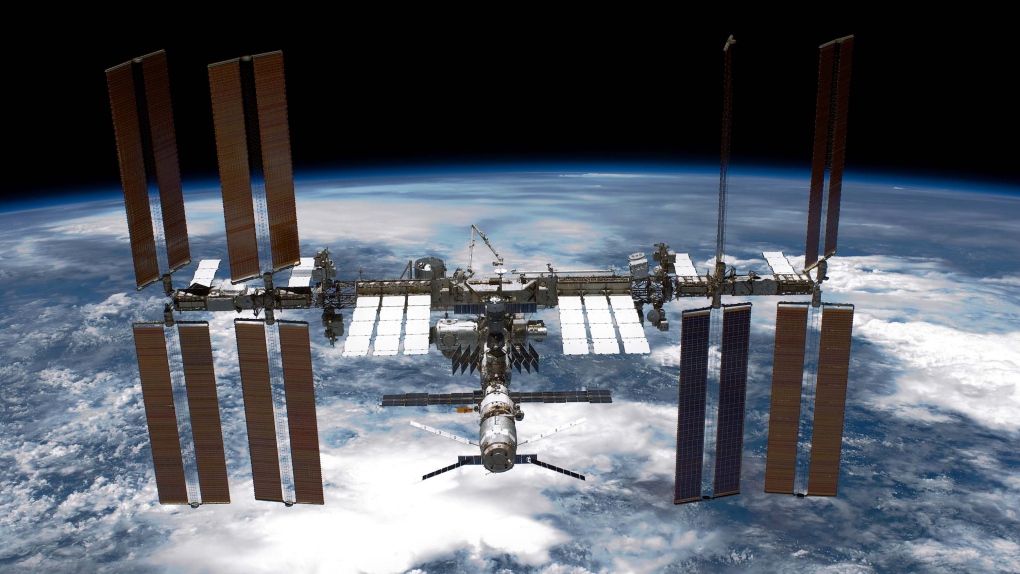MOSCOW -
Russian officials on Tuesday rejected accusations that they endangered astronauts aboard the International Space Station by conducting a weapons test that created more than 1,500 pieces of space junk but a White House official said the move by Russia would threaten activities in space “for years to come.”
U.S. officials on Monday accused Russia of destroying an old satellite with a missile in what they called a reckless and irresponsible strike. They said the debris could damage the space station, an assessment backed by NATO's chief.
Astronauts now face four times greater risk than normal from space junk, NASA Administrator Bill Nelson told The Associated Press. The defunct Russian satellite Cosmos 1408 was orbiting about 40 miles (65 kilometers) higher than the space station.
The test clearly demonstrates that Russia, “despite its claims of opposing the weaponization of outer space, is willing to ... imperil the exploration and use of outer space by all nations through its reckless and irresponsible behavior,” U.S. Secretary of State Antony Blinken said.
White House spokesperson Andrew Bates said Tuesday that Russia's action demonstrated its “complete disregard for the security, safety, stability and long-term sustainability of the space domain for all nations. This debris will continue to pose a direct threat to activities in outer space for years to come and puts at risk satellites all nations rely on for national security, economic prosperity and scientific discovery.” He said the United States would work with its allies “as we seek to respond to this irresponsible act.”
Even a fleck of paint can do major damage when orbiting at 17,500 mph (28,000 kph). Something big, upon impact, could be catastrophic to the space station.
Russia's Defense Ministry on Tuesday confirmed carrying out a test and destroying a defunct satellite that has been in orbit since 1982, but insisted that “the U.S. knows for certain that the resulting fragments, in terms of test time and orbital parameters, did not and will not pose a threat to orbital stations, spacecraft and space activities.” It called remarks by U.S. officials “hypocritical.”
Defense Minister Sergei Shoigu said the strike was carried out “with surgical precision” and posed no threat to the space station. Foreign Minister Sergey Lavrov also charged that it is “hypocrisy” to say that Russia creates risks for peaceful activities in space.
The Russian space agency Roscosmos wouldn't confirm or deny that the strike took place, saying only that the “unconditional safety of the crew has been and remains our main priority.”
Once the situation became clear early Monday morning, those on board the International Space Station - four Americans, one German and two Russians - were ordered to immediately seek shelter in their docked capsules. They spent two hours in the two capsules, finally emerging only to have to close and reopen hatches to the station's individual labs on every orbit, or 1 1/2 hours, as they passed near or through the space debris.
NATO Secretary-General Jens Stoltenberg agreed that Russia's actions endangered the space station.
“This was a reckless act by Russia to actually shoot down and destroy a satellite as part of a test of an anti-satellite weapons system,” which created a lot of space debris, Stoltenberg told reporters in Brussels.
He said it was of additional concern “because it demonstrates that Russia is now developing new weapons systems that can shoot down the satellites, can destroy important space capabilities for basic infrastructure on Earth, like communications, like navigation, or like early warning of missile launches.”
The German Foreign Ministry also said it was “very concerned” by the test, which it said resulted in “additional risks” for the astronauts on the ISS.
“This irresponsible behavior carries a high risk of miscalculations and escalation,” the ministry said, adding that the test underlines the urgency of an international agreement on rules for the peaceful use of space.
NASA Mission Control said the heightened threat could continue to interrupt the astronauts' science research and other work. Four of the seven crew members only arrived at the orbiting outpost on Thursday night.
A similar weapons test by China in 2007 also resulted in countless pieces of debris. One of those threatened to come dangerously close to the space station last week. While later the risk it posed was dismissed, NASA had the space station move anyway.
Anti-satellite missile tests by the U.S. in 2008 and India in 2019 were conducted at much lower altitudes, well below the space station, which orbits about 260 miles (420 kilometers) high.
------
Marcia Dunn in Cape Canaveral, Florida, Lorne Cook in Brussels, Geir Moulson in Berlin and Darlene Superville in Washington D.C. contributed to this report.






































